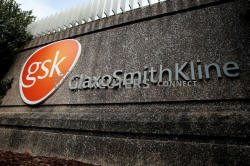 GSK,
Vir Biotech to expand COVID-19 research partnership for other diseases GSK,
Vir Biotech to expand COVID-19 research partnership for other diseases
 Send a link to a friend
Send a link to a friend
[February 17, 2021]
By Rebecca Spalding
(Reuters) - British drugmaker
GlaxoSmithKline Plc and Vir Biotechnology Inc will expand their existing
partnership developing antibody therapies for COVID-19 to research
therapies for other diseases, the companies said on Wednesday.
|
|
 The companies will research monoclonal antibody treatments for
influenza and other respiratory illnesses as a part of the
agreement, they said. The companies will research monoclonal antibody treatments for
influenza and other respiratory illnesses as a part of the
agreement, they said.
As a part of the deal, GSK will make a further $120 million equity
investment in Vir and will pay the company an additional upfront
payment of $225 million.
The companies announced a partnership last year to research COVID-19
treatments. Unlike vaccines, antibody treatments are designed to be
given to patients that have been diagnosed with the illness with the
aim of decreasing the severity of the disease.

One of the companies' experimental therapies for COVID-19 is
currently being studied in two global final stage trials. Results
from one of those studies are expected in the first quarter of 2021.
San Francisco-based biotechnology company Vir, which is run by
former Biogen Chief Executive Officer George Scangos, was founded in
2016 to research infectious diseases at a time when that area of
focus was rare for cutting-edge biotechnology start-ups.
The COVID-19 pandemic has since spurred large pharma companies'
interest in researching new ways to combat infectious pathogens,
including influenza.
[to top of second column] |

The effectiveness of standard flu vaccines varies year to year based
on how well researchers are able to predict that season's dominant
strains months in advance. The effectiveness of the vaccine can also
vary depending on the age of the recipient and other factors,
according to the Centers for Disease Control and Prevention.
The companies said they would work to further develop Vir's
experimental treatment for influenza A. The companies said that
people 65 and older with underlying conditions have a higher risk of
dying of the virus and that historically, vaccines have had lower
efficacy in this group.
(Reporting by Rebecca Spalding; Editing by Rashmi Aich)
[© 2021 Thomson Reuters. All rights
reserved.] Copyright 2021 Reuters. All rights reserved. This material may not be published,
broadcast, rewritten or redistributed.
Thompson Reuters is solely responsible for this content
 |